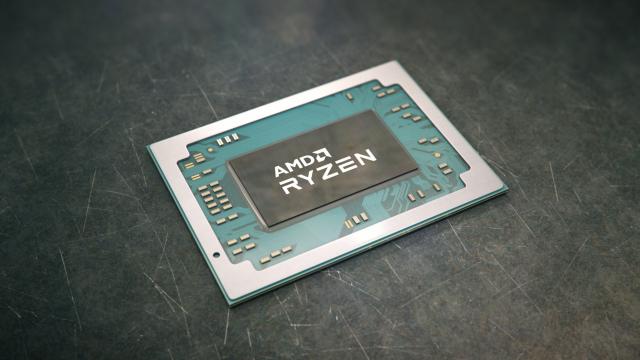Today AMD announced its Ryzen processor series is joining the Chromebook family — Athlon, too. Both APUs (that means CPU and integrated graphics in non-AMD terms) include Radeon Vega integrated graphics and will be found in mid-level to high-end Chromebooks with Athlon on the mid-level, and Ryzen on the high-end respectively. The current A6 and A4 series of AMD Chromebooks processors will be entry-level from here on out.
AMD first introduced its A6 and A4 processor-powered Chromebooks during CES 2019. We were impressed with how much Acer’s 315 offered for $US280 ($388) when we got a first look at it then, but the A6 and A4 processor Chromebooks have had mixed reviews since. From optimisation issues to so-so performance, there’s been a lot of room for improvement — especially considering Intel has been leading the space with better performing processors that aren’t as power hungry. The new Chromebook Ryzen and Athlon processors have better clock speeds, more cache, and better graphics all on a much smaller transistor process that matches Intel’s power consumption.
This is great news for ChromeOS fans who have been wanting to get a little more out of their Chromebooks without a significant increase in cost. The Ryzen and Athlon-based Chromebooks will compete with Intel’s Core 10th-gen mobile processors, and Pentium and Celeron processors. Though yesterday Intel did announce that its new 11th-gen Tiger Lake processors would also be coming to Chrome OS and could be from one to nearly three times faster than 10th-gen depending on the benchmark.
And Intel will need those speed boosts because AMD has aggressively been eating up the market. According to AMD, it has 21% of the Chromebook market as of Q2 2020, up nearly 16% from last year. The addition of Ryzen and Athlon processors could put AMD in a better position to take more of that in the future — assuming they’re just as good as its desktop and laptop processors.
The Ryzen line-up will include three 3000C series processors:
- Ryzen 7 3700C: 4-core/8-thread, 2.3 GHz base clock (4.0 GHz boost), 6 MB cache, 10 Radeon Cores at 1400 MHz, and 15 W TDP
- Ryzen 5 3500C: 4-core/8-thread, 2.1 GHz base clock (3.7 GHz boost), 6 MB cache, 8 Radeon Cores at 1200 MHz, and 15 W TDP
- Ryzen 3 3250C: 2-core/4-thread, 2.6 GHz base clock (3.5 GHz boost), 5 MB cache, 3 Radeon Cores at 1200 MHz, and 15 W TDP
AMD claims the Ryzen 3 3250C has over a 100% web browsing performance increase compared to its A6-9220C processor, as well as a 66% increase in graphics and productivity performance, and an 81% increase in photo editing performance. The company did not provide any performance statistics for its new Athlon APUs, but I would image it would be around a 50% increase in browsing performance
The Athlon line-up will include two 3000C series processors:
- Athlon Gold 3150C: 2-core/4-thread, 2.4 GHz base clock (3.3 GHz boost), 5 MB cache, 3 Radeon Cores at 1100 MHz, and 15 W TDP
- Athlon Silver 3050C: 2-core/4-thread, 2.3 GHz base clock (3.2 GHz boost), 5 MB cache, 2 Radeon Cores at 1100 MHz, and 15 W TDP
Unlike the current generation of AMD’s desktop and mobile processors, the Chromebook Ryzen and Athlon processors are not built on a 7nm process but rather a 12nm or 14nm process. Additionally, The Ryzen 7 and Ryzen 5 processors are using AMD’s Zen+ architecture, while the rest are built on regular ol’ Zen. Zen+ is what powered AMD’s second-generation desktop processors (2000 series), while Zen powered the first generation. But the A6 and A4 processes are built on an ancient 32mn process, so by that comparison these new processors will be leaps and bounds better.
Exact details on what Chromebook manufacturers will be releasing new models with Ryzen and Athlon processors is scant, but it’s likely all the usual Chromebook makers — Asus, Lenovo, Acer, HP, etc. — will put out models with these new processors at some point. Here’s to hoping for some official announcements before the end of the year and to getting our hands on a few models sooner rather than later.
